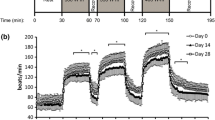Abstract
Sudden immersion in cold water initiates an inspiratory gasp response followed by uncontrollable hyperventilation and tachycardia. It is known that this response, termed the “cold shock” response, can be attenuated following repeated immersion. In the present investigation we examined how long this habituation lasts. Twelve healthy male volunteers participated in the experiment, they were divided into a control (C) group (n=4), and a habituation (H) group (n=8). In October, each subject undertook two 3-min head-out seated immersions into stirred water at 10 °C wearing swimming trunks. These immersions took place at the same time of day, with 4 days separating the two immersions. In the intervening period, the C group were not exposed to cold water, while the H group undertook six, 3-min head-out immersions in water at 15 °C. Two months (December), 4 months (February), 7 months (May) and 14 months (January) after their first immersion, all subjects undertook another 3-min head-out immersion in water at 10 °C. The H group showed a reduction in respiratory frequency (47 to 24 breaths · min−1), inspiratory minute volume (72.2 to 31.3 l · min−1) and heart rate (128 to 109 beats · min−1) during the first 30 s of immersion on day 5 compared to day 1. Seven months later these responses were still significantly reduced compared to day 1. After 14 months, heart rate remained attenuated but respiratory frequency and inspiratory minute volume had returned towards pre-habituation levels. The responses of the C group during the first 30 s of immersion were not altered. Both groups showed an attenuation in the responses during the remaining 150 s of immersion following repeated immersions. It is concluded that repeated immersions in cold water result in a long-lasting (7–14 months) reduction in the magnitude of the cold shock response. Less frequent immersions produced a decrease in the duration, but not the magnitude of the response.
Similar content being viewed by others
Author information
Authors and Affiliations
Additional information
Accepted: 25 May 2000
Rights and permissions
About this article
Cite this article
Tipton, M., Mekjavic, I. & Eglin, C. Permanence of the habituation of the initial responses to cold-water immersion in humans. Eur J Appl Physiol 83, 17–21 (2000). https://doi.org/10.1007/s004210000255
Issue Date:
DOI: https://doi.org/10.1007/s004210000255




